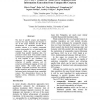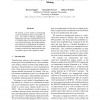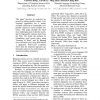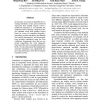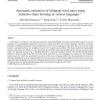109
click to vote
ACL
2012
13 years 4 months ago
2012
The lack of parallel corpora and linguistic resources for many languages and domains is one of the major obstacles for the further advancement of automated translation. A possible...
ACL
2012
13 years 4 months ago
2012
We propose a novel model to automatically extract transliteration pairs from parallel corpora. Our model is efficient, language pair independent and mines transliteration pairs i...
146
click to vote
EMNLP
2011
14 years 1 months ago
2011
Previous work has shown that high quality phrasal paraphrases can be extracted from bilingual parallel corpora. However, it is not clear whether bitexts are an appropriate resourc...
126
click to vote
EMNLP
2011
14 years 1 months ago
2011
We present a simple method for transferring dependency parsers from source languages with labeled training data to target languages without labeled training data. We first demons...
137
click to vote
ACL
2011
14 years 5 months ago
2011
We propose a language-independent method for the automatic extraction of transliteration pairs from parallel corpora. In contrast to previous work, our method uses no form of supe...
106
click to vote
COLING
2010
14 years 9 months ago
2010
This paper1 presents an empirical approach to mining parallel corpora. Conventional approaches use a readily available collection of comparable, nonparallel corpora to extract par...
111
click to vote
EMNLP
2009
14 years 12 months ago
2009
In this paper, we present an algorithm for extracting translations of any given multiword expression from parallel corpora. Given a multiword expression to be translated, the meth...
104
click to vote
COLING
2002
15 years 1 months ago
2002
The paper presents a statistical approach to automatic building of translation lexicons from parallel corpora. We briefly describe the pre-processing steps, a baseline iterative m...
115
click to vote
COLING
2002
15 years 1 months ago
2002
This paper proposes a learning and extracting method of word sequence correspondences from non-aligned parallel corpora with Support Vector Machines, which have high ability of th...
137
click to vote
IPM
2006
15 years 2 months ago
2006
In this paper, we propose a new learning method for extracting bilingual word pairs from parallel corpora in various languages. In cross-language information retrieval, the system...
